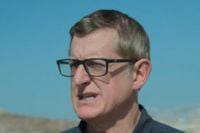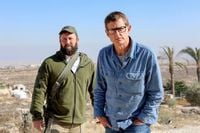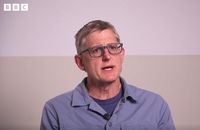In a compelling return to the screen, Louis Theroux's latest documentary, The Settlers, aired on BBC Two, offering a stark portrayal of the Israeli settler movement in the West Bank. This film, a follow-up to his 2011 work, Ultra Zionists, explores the unsettling reality of a group that has moved from the fringes of Israeli society to its very core. As tensions have escalated in the region following the Hamas attack on October 7, 2023, which resulted in the deaths of 1,200 Israelis, the documentary reveals how the settler ideology has gained significant political traction.
Dr. Abdul Wahid, a commentator on Muslim affairs, has described The Settlers as essential viewing for anyone seeking to understand the current situation in Palestine. He emphasizes that the documentary exposes the cold, calculated extremism of the settler movement, which aims to colonize historic Palestine and expel its indigenous people. "It was sickening to the stomach, yet necessary viewing for anyone who wants to understand what’s happening in Palestine today," Dr. Wahid stated.
Theroux's engaging interview style allows him to connect with his subjects, encouraging them to reveal their true beliefs. He meets settlers like Ari Abramowitz, who openly denies the existence of a Palestinian nation and insists, "The land is ours. Palestine doesn’t exist. It’s not a matter for debate." This rigid ideology is echoed by Daniella Weiss, the 79-year-old 'godmother of the settler movement,' who describes the process of establishing outposts and settlements, asserting that the Israeli government, while not officially endorsing them, provides military protection for these illegal endeavors.
The documentary also highlights the impact of these settlements on the daily lives of Palestinians. Theroux captures footage from Hebron, where Palestinians face intimidation and restricted movement due to checkpoints and the presence of Israeli Defense Forces (IDF). He notes that the settlers' actions create a tactic of making life impossible for the local population, which leads many to leave out of sheer despair. In one poignant moment, a Palestinian man named Issa gives Theroux a tour of Hebron, revealing the maze of checkpoints that restrict their freedom.
Critics have noted that while the documentary effectively showcases the settlers' extremist views, it may have benefited from including more voices of Israeli dissenters who oppose the settler agenda. However, Dr. Wahid argues that opinion polls indicate a dominant Zionist perspective within Israeli society, making the voices of dissent relatively rare.
As the film progresses, Theroux encounters various settlers who express their disdain for Palestinians. One rabbi refers to them derogatorily as "savages" and "camel drivers," showcasing the dehumanizing rhetoric that underpins the settler movement. The documentary does not shy away from illustrating the settlers' aspirations for ethnic cleansing, with some expressing a desire to "encourage" Palestinians to leave.
In addition to the settlers, Theroux also highlights the role of the Israeli military in enforcing the settlers' presence. He captures scenes of IDF soldiers intimidating Palestinians during nighttime raids, further emphasizing the oppressive atmosphere that pervades the region. Despite the soldiers' polite demeanor when interacting with Theroux, their actions convey a chilling reality for the local population.
The film's release comes at a time when the world is focused on the humanitarian crisis in Gaza, where over 50,000 Palestinians are estimated to have been killed since October 7, 2023. Amidst this turmoil, Theroux uncovers plans among settlers to expand their reach into Gaza, raising alarms about the potential for further violence and displacement.
Theroux's documentary has garnered praise for its unflinching examination of a complex and contentious issue. Viewers have lauded his ability to elicit moments of honesty from his subjects, allowing them to express their beliefs without feeling threatened. One viewer remarked, "Louis Theroux's brilliance as a journalist is that he has such a gentle approach that truly unhinged people feel safe enough to spout their worldviews."
In an era where media narratives often simplify the Israeli-Palestinian conflict, The Settlers stands out for its commitment to presenting the stark realities faced by both settlers and Palestinians. As the documentary unfolds, it challenges viewers to confront the implications of unchecked nationalism and the consequences of occupation.
Ultimately, Theroux's work serves as a reminder of the complexities surrounding the Israeli-Palestinian conflict. His ability to navigate these treacherous waters with sensitivity and insight is a testament to his growth as a documentary filmmaker. As Dr. Wahid aptly puts it, this documentary is crucial for anyone seeking to understand the nature of settler colonial occupation and the ethnic cleansing it entails.
For those interested in exploring this pressing issue, The Settlers is available for viewing on BBC iPlayer.



